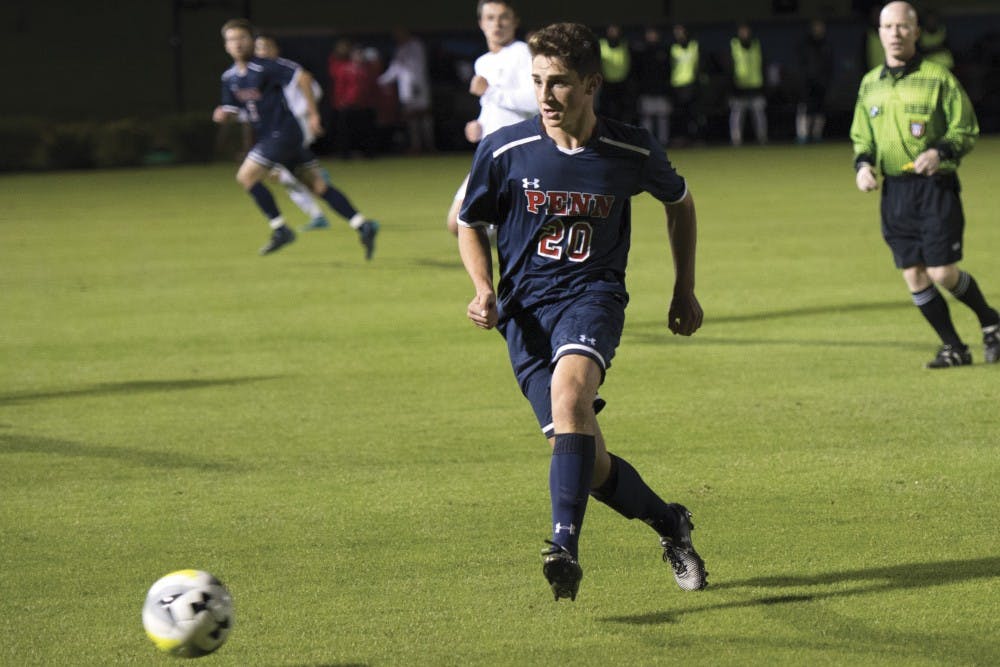
Soccer is without doubt the world’s sport.
Outside the United States, the majority of athletes grow up playing soccer at some point in their lives. And now, throughout much of American collegiate soccer, international players are becoming more prominent as schools are increasingly willing to expand their recruiting networks overseas.
Although many Ivy League programs — due to more limited athletic resources and stricter academic standards — rarely look outside the country for athletes, international recruits sometimes decide that they want to come to schools like Penn to continue their athletic careers.
Specifically, over the last four years, Penn has been able to land two recruits from England. Senior Forrest Clancy and freshman Teddie Levenfiche both hail from London, where they grew up playing “football” after eventually choosing it over their other national sports, rugby and cricket.
“I wasn’t even allowed to play rugby at the school I went to from ages one to 18,” Clancy said. “There was no other sport for me to play during the summer.”
Levenfiche experimented with other sports before settling on soccer.
“I used to play rugby, cricket and soccer at school. My coaches always told me I should’ve been a rugby player but I persisted with football,” he said. “I picked soccer for the love of the game. I had season tickets for Chelsea since I was three years old, watching the legends, John Terry, Frank Lampard. ... It was an easy choice.”
Along with playing for their school teams, Clancy and Levenfiche also played for the junior academy teams associated with most English Premier League clubs that are used to find and create the best youth talent.
Clancy played in the Queens Park Rangers academy system, as well as the U-18 All-England private school team. Similarly, Levenfiche was a member of the Fulham, Watford and Reading junior academies before he signed a junior contract with Barnet F.C. Levenfiche’s commitment, while providing many incredible opportunities, also coincided with his decision to focus on the academics required to come to Penn.
Clancy had a similar experience.
“It was very aggressive. You are playing against kids who have nothing to lose, kids who certainly had different priorities than mine,” he said. “It taught me grit.”
The style of soccer played in England and in the U.S. is also quite different, and the discrepancy required some adjustment when the duo began playing for the Quakers.
“American soccer is a lot more physical,” Clancy said. “It requires you to be bigger, stronger, faster while in England they focus on the technical side of the game.”
Levenfiche agreed.
“I just think college soccer is a lot quicker — a lot more physical — so it takes some getting used to the tempo,” he noted. “At first it was definitely a culture shock, and a transition had to be made. It made me question whether I am good enough to play at this level.
“But with teammates pushing you and after getting more and more touches, you start to get better. I think I have acclimated.”
Coach Rudy Fuller was impressed with his two British players and how they have adjusted to American soccer, which he agreed was one of the most difficult parts of coming to this country.
“It’s a very athletic game and I think generally speaking in Europe, games are called a lot tighter. A lot more is called as a foul so it is an adjustment,” he said. “It’s one thing to be able to pull plays off when you’re not getting knocked and banged, and it’s another thing down when a guys is chasing you down with speed and banging you a bit. ”
From after-school practices to playing alongside future Premier League stars, such as Clancy’s former teammate Raheem Sterling, Clancy and Levenfiche have had similar soccer experiences to many Americans while also training in very different environments than their American teammates.
And although international talent is uncommon for Penn soccer, players who can bring different styles and experiences can make the team stronger in the long run. That’s the goal for the Red and Blue.
The Daily Pennsylvanian is an independent, student-run newspaper. Please consider making a donation to support the coverage that shapes the University. Your generosity ensures a future of strong journalism at Penn.
DonatePlease note All comments are eligible for publication in The Daily Pennsylvanian.








